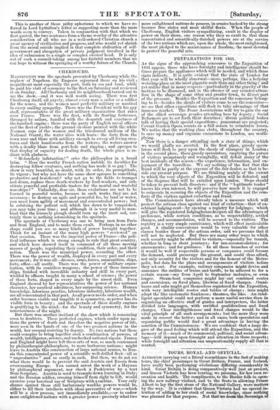CHERBOURG.
MAGNIFICENT was the spectacle presented by Cherbourg while the nephew of Napoleon the Emperor sojourned there on his visit ; magnificent most especially the port, both by sea and land, while he paid his visit of ceremony to the fleet on Saturday and reviewed it on Sunday. All Cherbourg and its neighbourhood turned out to see the show,—and it was well worth seeing. There was first Cherbourg itself, all gayety, almost every man a sailor or a soldier for the nonce, and the women most perfectly military or nautical in every smiling sympathy. There was the President with his gay staff, representative of the great military organization that rules over France. There was the fleet, with its floating fortresses, thronged by sailors, handled with the despatch and exactness of the handiest engine ; there was the party of English naval officers and the fleet of yachts ; the ground on shore painted with the white Norman caps of the women and the tricoloured uniform of the National Guard; the water alive with boats : the forts from the town roar and blaze with artillery enough te sweep all living crea- tures and their handiworks from the waters; the waters answer with a deadly blaze from port-hole and rigging ; end apropos to that display of capacity for dealing death, the whole place is ra- . diant with gladness. " Melancholy infatuation !" cries the philosopher in a broad brim. "Here the worthy French nation unfolds its faculties for destroying fellow creatures, and nothing has made it so gay ! The, show is very beautiful, no doubt, with its order, its promptitude, its vigour ; but why not have the same show apropos to something productive and beneficent? why not go to the fields to trumpet and drum, replace these death-workers by food-workers, and sub- stitute peaceful and. profitable tinders for the mortal and wasteful war-ships ? " Unluckily, dear sir, these evolutions are not to be learned in peaceful works, because in such works they are not necessary: to destroy an agile and powerful foe, by land or water, you must learn agility of movement and concentrated power; but in subduing the patient soil, which lies down to be vanquished, you may take your time; and although it is very useful to man- kind that the leisurely plough should turn up the inert sod,, cer- tainly there is nothing astonishing in the spectacle. The spectacle at Cherbourg was one to bring men from Paris and from England, and to make them exult. Perhaps in no other shape could you see so many kinds of power brought together. Think for an instant of the many high powers "reviewed" on that occasion. There was the imperial power of France—the poli- tical influence which is strong enough to rule that great country, and which here showed itself in command of all those moving masses of people, regulating their condition, their order, and their action. There was the municipal power, seconding the other. There was the power of wealth, displayed in every part and every movement; for it was all—dresses, arms, forces, ammunition, ships, forts, office—all costly. There was the power of military organ- ization, with its countless weapons; the power of those immense ships, finished with incredible =dusty and skill in every part, wielded by officers taught in many a school of science ; the power of those forts, shaped in every angle by the nicest skill. Even England showed by her representatives the power of her national character, her nautical adroitness, her surpassing science. Human knowledge, laborious practice, laborious industry, laboriouS wealth, are all concentrated in that port. As all power needs order, and when order becomes visible and tangible it is symmetry, so power has its visible form in beauty ; and the spectacle of these deadly engines is gratifying to the mind—for the beauty and symmetry, for the consciousness of the might. But there was another incident of the show which is reassuring even to doubters. These perfected engines, which confer upon na- tions the power of death and therefore the negative power of life, were seen in the hands of one of the two greatest nations in the world, her coequal assisting by deputy. No two nations but these could conspire to bring together such a combination of powers, of wealth, intelligence, science, and unchecked national vigour. France and England might have left these arts of war, so much contemned by philanthropist-philosophers, to more barbarous nations ; might leave to Austria this construction of large national armies to Rus- sia this concentrated power of a scientific well-drilled. fleet—all so I " unproductive " and so costly in cash. But then; we do not see what there would be to prevent the said Austria and Russia from overrunning Europe. You cannot arrest the work of a Haynau by philosophical argument, nor check a Paskiewiez by. a text from Scripture. Austria is used to trample down learning m. Italy; and the Russian soldier, crossing himself from right to left, would exorcise your heretical use of Scripture with &carbine. Your only chance against those still barbarously warlike powers would be, either to fill their intellects with ideas preventive of war,—which will be a slow process, not immediately available,—or to endow more enlightened nations with a greater power : precisely what two
more enlightened nations do possess in armies backed by the strong beeatise free states and most skilful fleets. When the people of Cherbourg, English visiters sympathizing, exult in the display of power on their shore, one reason why they so exult is,- that those concentrated and scientifically-finished powers are at the service of the two nations which are, wpon the whole, the most enlightened, the most pledged to the maintenance of freedom, the most devoted to protect the peaceful arts.


























 Previous page
Previous page